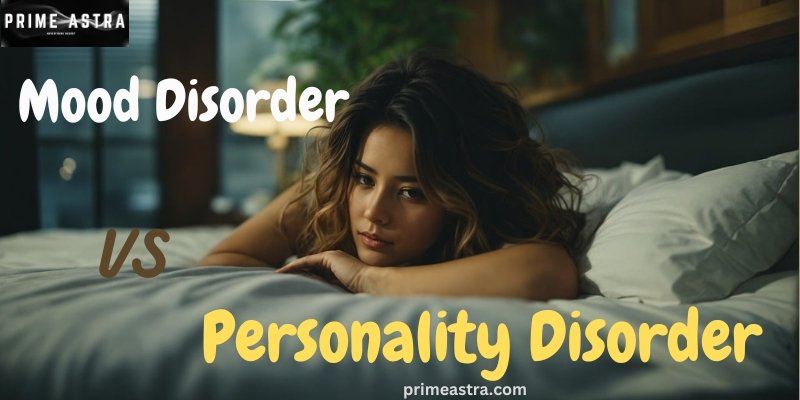
Mental fitness contains an extensive range of conditions, and some of the most generally careworn are mood disorders and personality issues. While both affect emotional and mental well-being, they’re distinct, signs and symptoms, and treatment strategies. In this article, we’ll explore mood disorders vs persona ailment, clarify their differences, and offer a manual to better expertise these intellectually fitness-demanding situations.
What Are Mood Disorders?
A mood disorder is a shape of intellectual contamination that generally influences someone’s emotional us of. It includes severe emotional highs, lows, or fluctuations in some of the 2. A person with a temper disease regularly struggles to adjust their emotions, which can intervene with everyday lifestyles, relationships, and popular well-being.
List of Mood Disorders
- What Are Mood Disorders?
- Is Anxiety a Mood or Personality Disorder?
- What Are Personality Disorders?
- Clusters of Personality Disorders
- Difference Between Mood and Personality
- Mood vs Personality Disorder MCAT
- Mood Disorder vs Personality Disorder Reddit Conversations
- How to Seek Help: Diagnosing and Treating Mood and Personality Disorders
- Conclusion: Mood Disorder vs Personality Disorder
Mood troubles are to be had severe bureaucracy. Some of the most commonplace consist of:
- Major Depressive Disorder (MDD): Characterized using chronic disappointment, hopelessness, and a lack of hobbies in sports that when introduced delight.
- Bipolar Disorder: An ailment that causes severe temper swings, starting from emotional highs (mania) to lows (melancholy).
- Persistent Depressive Disorder (Dysthymia): A milder but chronic form of despair lasting for at least years.
- Cyclothymic Disorder: A milder shape of bipolar sickness, wherein mood swings are not as immoderate but disruptive to everyday existence.
- Seasonal Affective Disorder (SAD): A type of melancholy that occurs at fantastic instances of the 365 days, often in the course of wintry weather at the same time as there’s less sunlight.
- Postpartum Depression: A severe, long-lasting form of melancholy that occurs after childbirth.
Understanding the mood disorders list helps in recognizing the signs and symptoms and looking for suitable treatment. Mood problems can result from genetic predisposition, chemical imbalances in the mind, trauma, or environmental stressors.
Is Anxiety a Mood or Personality Disorder?
A commonplace question is whether tension is classified as a mood disorder or a personality disorder. The answer is neither, however, it’s intently related to both. Anxiety problems, together with generalized anxiety ailment or panic ailment, are break-free mood or character problems. However, tension often coexists with mood problems like despair or bipolar disease, making it essential to address both conditions in the course of treatment.
For extra information, you may discover Is anxiety a mood or personal ailment? To recognize its class.
What Are Personality Disorders?
Personality issues involve deeply ingrained, inflexible styles of questioning and behaving that deviate notably from societal expectancies. People with personality sickness may additionally have problems regarding others or responding flexibly to conditions. These problems often emerge in formative years or early maturity and are long-lasting.
Clusters of Personality Disorders
Personality disorders are labeled into 3 clusters:
Cluster A: Odd or Eccentric Disorders
- Paranoid Personality Disorder: Distrust and suspicion of others.
- Schizoid Personality Disorder: Detachment from social relationships and restrained emotional expression.
- Schizotypal Personality Disorder: Discomfort in close relationships and distorted thinking.
Cluster B: Dramatic, Emotional, or Erratic Disorders
- Borderline Personality Disorder (BPD): Intense fear of abandonment, unstable relationships, and impulsivity. Individuals with Borderline Personality Disorder regularly enjoy fast temper changes and conflict with their self-image.
- Antisocial Personality Disorder: A disregard for others’ rights, deceitful conduct, and lack of regret.
- Histrionic Personality Disorder: Excessive emotionality and a need for attention.
- Narcissistic Personality Disorder: An inflated feeling of self-importance and a deep need for admiration.
Cluster C: Anxious or Fearful Disorders
- Avoidant Personality Disorder: Extreme sensitivity to rejection and feelings of inadequacy.
- Dependent Personality Disorder: A pervasive want to be looked after, mainly due to submissive behavior.
- Obsessive-Compulsive Personality Disorder (OCPD): A preoccupation with orderliness, perfectionism, and control.
Difference Between Mood and Personality
The number one difference between mood and persona issues is that temper issues are episodic, whereas character problems are enduring tendencies. For example, someone with bipolar sickness may enjoy extreme mood swings, but their baseline persona remains strong among episodes. In contrast, persona issues affect how a person continually interacts with the world, irrespective of emotional nation.
Mood Disorder vs Personality Disorder: What’s the Difference?
At first look, it’s easy to confuse mood disorders with personality problems, as both can cause emotional instability and have an effect on relationships. However, they vary in several key methods:
- Mood disorders are episodic, which means they arrive and cross. For instance, someone with a principal depressive ailment may additionally experience deep unhappiness for weeks or months but eventually go back to their normal emotional state.
- Personality disorders, on the other hand, are chronic and deeply ingrained. A man or woman’s behavior patterns don’t trade based on emotional episodes but continue to be steady through the years.
Mood vs Personality Disorder MCAT
A not unusual manner to keep in mind the difference (as frequently highlighted in MCAT prep) is to consider mood disorders as conditions that affect how you feel at a given time, whilst personality problems affect the way you behave all the time. For more explanation, the MCAT clarification of mood vs character sickness offers a simplified breakdown.
Mood Disorder vs Personality Disorder Reddit Conversations
Many humans are seeking answers on forums like Reddit, wherein people proportion their experiences with both mood and character issues. These discussions frequently highlight the demanding situations of receiving an accurate diagnosis and finding powerful treatment.
For example, it’s no longer unusual for someone with bipolar sickness to be misdiagnosed with Borderline Personality Disorder because the speedy temper shifts in each situation can appear comparable. However, one key difference is that bipolar ailment temper swings are linked to chemical imbalances, while BPD is associated with emotional dysregulation and fear of abandonment.
How to Seek Help: Diagnosing and Treating Mood and Personality Disorders
If you suspect you or someone is dealing with a mood disorder or persona disorder, the first step is to seek advice from an intellectual fitness professional for an accurate analysis. Here’s an easy step-by-step guide to searching for help:
Step-by using-Step Guide to Treatment
- Consult a Mental Health Professional: A psychiatrist or psychologist can verify your symptoms via interviews, questionnaires, and now and then lab exams.
- Understand Your Diagnosis: Whether it’s a mood disorder or personality ailment, information on the root of your signs and symptoms is critical for an effective remedy.
- Medication for Mood Disorders: Medications like antidepressants or temper stabilizers can help manage temper swings, depression, or manic episodes.
- Psychotherapy for Personality Disorders: Personality issues are first-rate treated with therapy, especially lengthy-term methods like Dialectical Behavior Therapy (DBT) or Cognitive Behavioral Therapy (CBT).
- Lifestyle Adjustments: Managing mood problems often entails adjustments in eating regimen, workout, and sleep habits. For personality issues, specializing in building wholesome relationships and enhancing verbal exchange skills can be beneficial.
Conclusion: Mood Disorder vs Personality Disorder
Both mood disorders and character issues are serious intellectual health situations that require attention and remedy. While mood disorders are usually marked by temporary changes in emotional state, persona problems constitute deep-rooted patterns that affect someone’s whole life.
Seeking assistance from a mental health professional is step one towards handling those conditions. Whether you’re struggling with continual mood swings or challenges in forming strong relationships, treatment is to be had, and recuperation is feasible. Remember, intellectual fitness is just as important as bodily fitness, and there’s no disgrace in reaching out for aid.

Umar Farooq is a health informational author on primeastra.com, specializing in creating insightful content on health, wellness, and medical topics. His well-researched articles aim to educate readers and provide practical guidance for maintaining a healthy lifestyle.

